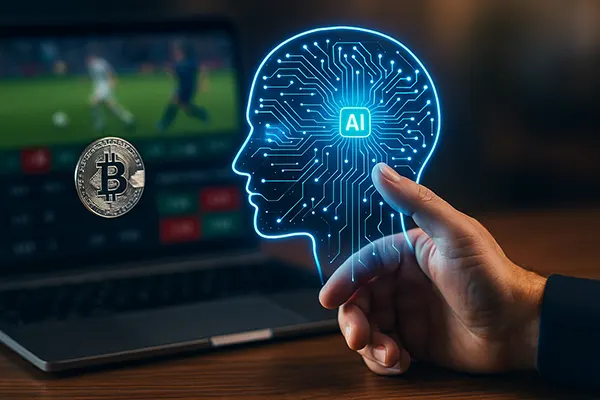
Betting on Artificial Intelligence: How AI Predictions Impact Crypto Bookmakers
Over the past few years, the fusion of artificial intelligence and blockchain technology has transformed the world of online betting. Cryptographic bookmakers, leveraging decentralised systems, are now integrating AI-based predictions to enhance the accuracy and transparency of their services. As of February 2025, this synergy is not only driving technological innovation but also reshaping customer expectations, security protocols, and market strategies in crypto betting.
The Growing Role of AI in Crypto Betting
Artificial intelligence has introduced an unprecedented level of data analysis in crypto betting. By processing massive datasets in real time, AI models offer bookmakers valuable insights into player behaviour, market trends, and match outcomes. Predictive algorithms are designed to detect patterns beyond human capabilities, allowing betting platforms to create more dynamic odds and personalised promotions for users.
Furthermore, the automation of risk management has become a key feature of AI integration. Systems based on machine learning adapt quickly to changes in betting patterns, minimising potential losses and ensuring stable profitability for operators. With predictive analysis, platforms can detect suspicious activity or fraud attempts much faster, strengthening their security frameworks.
AI also plays a crucial role in improving user experiences. By analysing historical data and user preferences, crypto bookmakers can offer customised betting opportunities, loyalty programmes, and real-time customer support. These personalisations enhance user satisfaction and long-term retention rates.
Advantages and Limitations of AI Predictions
Despite its numerous advantages, AI-driven betting is not without limitations. One key advantage lies in the system’s ability to eliminate human bias and emotional decision-making, thus improving the fairness and objectivity of bets. Sophisticated models can identify betting opportunities that are statistically undervalued, offering better odds for both bookmakers and bettors.
On the other hand, AI models depend heavily on historical data, which might not always account for unforeseen events such as player injuries, weather conditions, or sudden market shifts. Therefore, overreliance on AI predictions without human oversight can introduce new risks rather than mitigate existing ones.
Finally, the ethical considerations regarding data usage and algorithmic transparency remain a major issue. Users demand to understand how predictions are made and how their data is handled, pushing crypto bookmakers to maintain ethical standards and regulatory compliance.
Impact of AI Predictions on Betting Strategies
AI-driven models have revolutionised the way bettors and bookmakers approach betting strategies. Instead of relying on intuition or surface-level statistics, bettors are now equipped with deeper analytical tools. These tools enable more informed decision-making, resulting in improved success rates and reduced long-term losses for strategic bettors.
For crypto bookmakers, predictive analytics allow for the dynamic adjustment of odds. Real-time data processing helps identify when odds are becoming unbalanced and adjust them accordingly, maintaining the house edge without discouraging player engagement. This balance is critical in highly competitive markets.
Moreover, AI allows the automation of bonuses and promotional strategies based on user behaviour. By predicting when a player might churn or when engagement levels drop, crypto bookmakers can deliver timely incentives, keeping users active without excessive marketing expenditure.
Risks for Crypto Bookmakers Integrating AI
While AI offers tremendous advantages, crypto bookmakers must navigate certain risks. One significant challenge is algorithmic bias, which can arise from flawed data sets. If a model is trained on biased data, it may make unfair or inaccurate predictions, leading to reputational and legal risks.
Another risk is cybersecurity. Integrating AI systems creates new vulnerabilities that can be exploited by cybercriminals. Ensuring the protection of user data and the integrity of predictive algorithms becomes an even greater priority in AI-enhanced environments.
Regulatory uncertainty also poses a threat. Many jurisdictions are beginning to scrutinise AI applications in financial and gaming sectors. Crypto bookmakers must stay proactive, adapting their systems to comply with evolving regulations to avoid penalties and disruptions to their operations.

The Future of AI in Crypto Betting
Looking forward, the integration of AI into crypto betting is expected to deepen. With advancements in neural networks, natural language processing, and quantum computing, AI models will become even more sophisticated, providing highly nuanced predictions that account for a broader range of factors.
Decentralised AI solutions are also gaining popularity. Projects that combine AI with decentralised oracle networks allow betting platforms to access more transparent and tamper-proof data sources, reinforcing trust among users and regulators alike. These decentralised approaches may reduce operational risks while enhancing data reliability.
Finally, the future of AI in crypto betting will heavily depend on user trust and transparency. Bookmakers that openly communicate their AI methodologies, prioritise ethical data use, and maintain user-centric services will likely lead the market, setting new standards for innovation and fairness.
Challenges and Opportunities Ahead
One of the biggest challenges will be balancing innovation with regulatory demands. As authorities impose stricter controls, crypto bookmakers will need to find ways to innovate within compliant frameworks, which may slow down certain aspects of development.
Opportunities, however, remain vast. AI can introduce new betting formats, improve fairness monitoring, and offer superior fraud detection systems. Crypto bookmakers that can harness AI effectively will differentiate themselves in an increasingly crowded marketplace.
Ultimately, AI will not replace human judgement but will serve as a powerful tool to enhance decision-making processes on both the operator and bettor sides, driving the next era of transformation in the world of crypto betting.
Popular articles
-
 How to Check a Crypto Wallet Before Your First Transaction: Setup, ...
How to Check a Crypto Wallet Before Your First Transaction: Setup, ...Sending your first cryptocurrency transaction is not simply a matter …
-
 Is Real Decentralisation Still Possible? A 2026 Analysis of Nodes a...
Is Real Decentralisation Still Possible? A 2026 Analysis of Nodes a...“Decentralised” is one of the most used words in crypto, …
